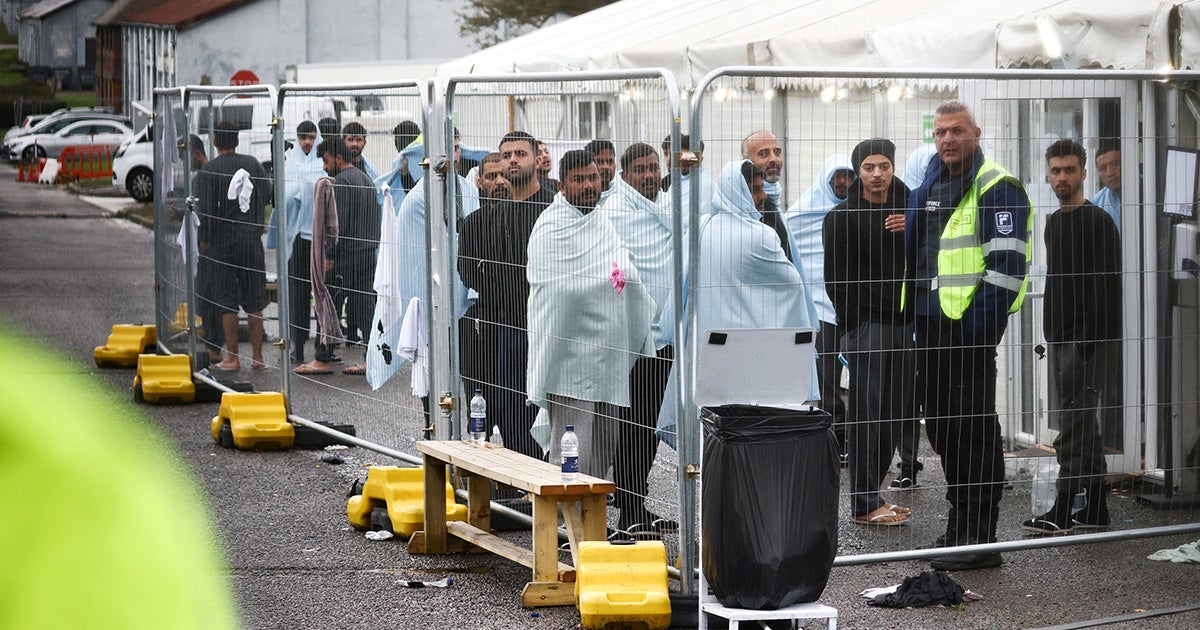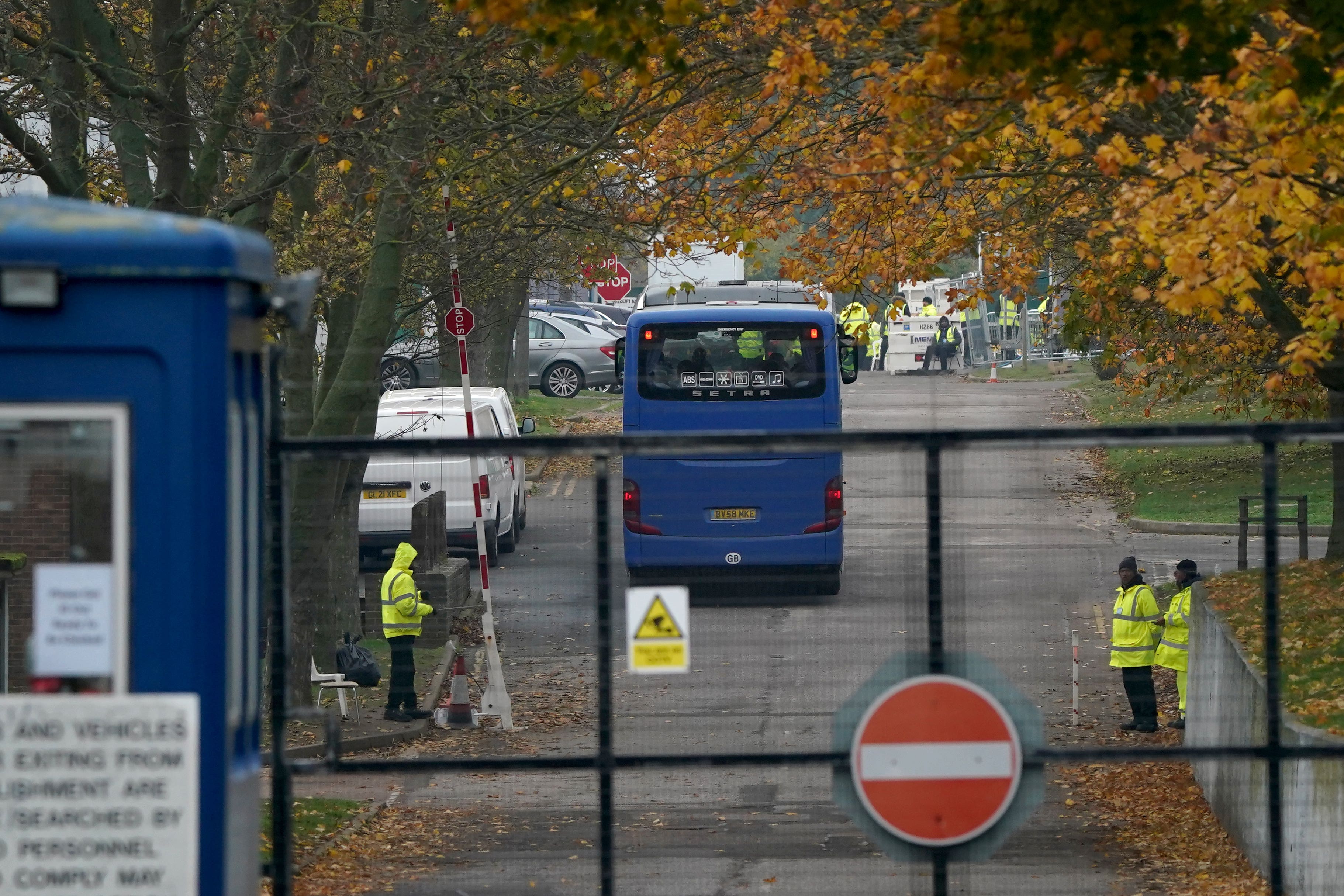‘A reprehensible way to behave’: Crises mount up at the Home Office
Staff fear they are being made to break the law over Channel crossings, writes Lizzie Dearden

Home Office staff have been raising concerns that they are breaking the law with their treatment of asylum seekers crossing the English Channel, but say they are being ordered to “carry on” by the government amid continued pressure to stop small boats.
It has lost several expensive legal challenges, including over financial support for asylum seekers and the blanket seizure of mobile phones, and is fighting more cases over the Manston processing centre.
Civil servants are understood to have flagged concerns about the lengthy detention of people in tents long before the immigration minister admitted the site was not “legally compliant” in November.
Some believe the Home Office now waits for legal challenges to be launched before acting on internal advice warning of the need to change policies and processes related to migration, causing huge sums of public money to be spent on court cases it knows it will lose.
It has worsened a record backlog of asylum cases by refusing to consider applications from people who have passed through safe countries before reaching the UK.
The policy hinges on the ability to send “inadmissible” asylum seekers to those places, or to other nations that could process their claims, but no replacement has been created for an EU-wide transfer mechanism lost through Brexit.
The government struck a deal aiming to make Rwanda a destination for those who would previously have been sent to countries like France and Italy, but the scheme has been delayed by multiple legal challenges.
While the High Court has ruled the plans were lawful overall, every decision challenged by individual migrants selected for deportation to Rwanda was quashed by judges. Charities are expected to appeal the court’s ruling on the wider policy in January.
The Independent understands that Border Force staff working in reception centres have been questioning orders over fears they go beyond their legal powers, and that senior civil servants have raised concerns they will be liable for effecting unlawful government policies.
An officer from the ISU, a union representing Border Force and immigration staff, said the Home Office had been “knowing stuff is illegal and doing it anyway”.
Lucy Moreton told The Independent: “You’ll find that over and over again.
“We’ve been telling the Home Office for ages that staff have no power to use force [against asylum seekers] but we’re doing it anyway. We know we can’t detain migrants in Manston for long periods of time without an immigration bail tribunal but we’ve been doing it anyway.”
In a strongly-worded ruling issued in October, High Court judges found that a “failure of governance” in the Home Office meant that appropriate steps had not been taken to “ensure that what was done was being done lawfully” in the response to small boats.
The ruling was triggered by the blanket seizure of all migrants’ mobile phones to trawl them for information. The Home Office falsely denied the policy existed before performing a U-turn and admitting it was unlawful.
Ms Moreton said that staff questioned the basis for phone seizures before the legal challenge was launched, but when “queries were raised they were just told to do it”.
She believes the department routinely waits for legal action before stopping conduct it knows is unlawful.
“It’s a reprehensible way for the government to behave,” Ms Moreton said.
“You cannot order your staff to do things when staff are saying ‘hang on, that’s illegal’, or to wait until vulnerable people get legal advice to stop behaving unlawfully.”
A civil service source said staff had complained of being “put in positions where they are acting unlawfully” by the government.
“The civil service code means that every civil servant must act within the law, and the ministerial code requires that they don’t put civil servants in a position where they break the code,” they added.
“It says civil servants need to deliver the business of an elected government, but they can’t do unlawful things.”
The source said that after internal legal advice found that the detention of asylum seekers at Manston for long periods was unlawful, Suella Braverman sought a second opinion from barrister Sir James Eadie KC instead of acting immediately.

An unequivocal result caused the following “scurrying and madness” to procure new hotel places to move people to, the source said, adding: “There is a pattern in terms of how until ministers are told they can’t do something, they carry on doing it.”
Robert Jenrick, the immigration minister, told MPs that there had been a “failure to plan” for a surge in Channel boats in November.
But a report published the previous month by the immigration watchdog said the Home Office had internally predicted 65,000 arrivals in 2022 - a number far higher than that reached.
Fresh concerns were raised when the prisons watchdog detailed incidents he witnessed during a visit to Manston.
Charlie Taylor, HM Chief Inspector of Prisons, told a parliamentary committee the former military base was “not a centre that should be accommodating people”.
“We saw one very vulnerable detainee being handcuffed whilst being taken to hospital,” he said. “We couldn’t find a justifiable risk assessment for handcuffing that particular individual.”
Mr Taylor said physical and mental health issues were not being fully recorded, “paperwork wasn’t being filled in” and potential trafficking victims were not being spotted.
Lawyers appearing before the same committee raised concerns that detainees at Manston are not being properly offered legal advice, saying they had never been contacted by anyone at the facility, despite more than 40,000 people passing through it this year.
Legal action has been launched accusing the Home Office of detaining people beyond statutory time limits, in “egregiously defective conditions” that exposed them to infectious diseases including diphtheria.
A man with the illness died in November, after being held at Manston for a week after arriving on a small boat. An inquest into the death of 31-year-old Hussein Haseeb Ahmed is expected to probe the care he received.
Mr Jenrick has subsequently rewritten the law governing the operation of Manston and other short-term holding facilities, meaning that from 5 January the legal detention limit will be four days rather than 24 hours, and the statutory standards of healthcare, communications, legal advice and sleeping conditions will be downgraded.
Several cases and reports have shown occasions where ministers ignored internal advice warning that they could be breaking the law.

Earlier this month, the High Court ruled that the home secretary had been acting unlawfully since September by failing to raise the weekly payments given to destitute asylum seekers in line with inflation.
Documents showed that ministers had been given advice by civil servants in August, September and November recommending an increase, and eventually warning that doing nothing would be unlawful.
A judge said a barrister representing the Home Office was “unable to put forward any possible defence of the failure to make a decision, or the failure to increase income support”, and that ministerial changes through the governments of Boris Johnson, Liz Truss and Rishi Sunak were not a “lawful basis for the failure”.
Only after the scathing judgment was handed down did it announce that civil servants’ recommendation of an increase from £40.85 to £45 a week would be implemented - but only “on an interim basis” and for asylum seekers not given food and accommodation.
Records published by the immigration watchdog in October show warnings that the government was acting unlawfully by housing unaccompanied child asylum seekers in hotels also being ignored.
An entry on an internal “risk register” from August 2021 said: “Senior civil service confirmed we are running children’s homes and committing a criminal offence but relying on the defence of necessity.
“The mitigation is to stop doing this … advice is going to ministers.” Hotels are still being used for child asylum seekers and the Independent Chief Inspector of Borders and Immigration found “limited evidence of a concrete exit strategy”.
Documents disclosed to the High Court last year also showed that Priti Patel rejected official advice to give migrants in hotels £12.11 a week for essential living costs, arguing the money would be a “pull factor”.

An internal missive from Ms Patel’s private office in September 2020 said she and the immigration minister “would like to see all the department's organisational/financial efforts focused on reducing hotel use rather than mitigating the impacts”. Around 40,000 asylum seekers are currently being accommodated in hotels.
The Home Office lost a legal challenge over the support payments, with a judge finding that the former home secretary had “misdirected herself in law”.
A spokesperson for the department said: “Legal and operational advice is taken into account by the Home Secretary and ministers at all times, including on asylum issues, and is it right that elected ministers make decisions on issues that affect people in the UK.”
It is rare that internal legal guidance becomes public. The government has refused a Freedom of Information request for risk registers relating to the migration deal struck with Rwanda, claiming that releasing them would not be in the public interest because it could damage the UK’s relationship with the country.
An official letter said: “Disclosing the information would provide details of the government research, analysis and assessment on Rwanda as a partner in immigration policy.
“This would be likely to prejudice the UK’s international relations with Rwanda. Disclosure would be likely to lead to incorrect assumptions and misconceptions of Rwanda and damage the UK’s international relations.”
The Home Office said it was “important that the UK … avoids giving offence to other nations and retains the trust of our international partners”.
It also cited an exemption for information that, if released, would affect the “free and frank exchange of views” in government and “inhibit the ability of Home Office officials and others to express themselves openly, honestly and completely, or to explore extreme options”.
The Independent understands that the legal challenge against the plans to forcibly deport asylum seekers to Kigali was anticipated, both by individuals affected and on a policy level.
The government said that record Channel crossings had put the system under pressure but it was committed to the welfare of all migrants and kept processes under review.
It said staff were trained in safeguarding and use force rarely, and that mobile phones were now only seized when there are reasonable grounds of suspected involvement in criminal activity.
A Home Office spokesperson added: “The home secretary has taken urgent decisions to alleviate issues at Manston and source alternative accommodation. It is right we look at all available options so decisions can be made based on the latest operational and legal advice. “Staff at Manston have worked tirelessly to get numbers back under capacity, and they continue to do that as swiftly as possible while ensuring people’s needs are met.”






Join our commenting forum
Join thought-provoking conversations, follow other Independent readers and see their replies
Comments